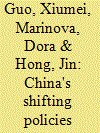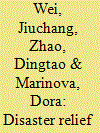| Srl | Item |
| 1 |
ID:
120814


|
|
|
|
|
| Publication |
2013.
|
| Summary/Abstract |
China is currently not only the most populous country on earth, but also the world's largest greenhouse gas (GHG) emitter. As China's population growth continues contributing to the overall global population increase, the country remains a significant player in the global problems related to climate change. The Chinese government, however, has recognized that a low-carbon economy is in the country's long-term economic and social interests and this is now a key part of its national development strategy. This paper examines the evolution of policies for sustainability in China and explores their compositions, functions and operational mechanisms. Some emerging features and trends in China's development model are examined, arguing that they represent a clear shift towards sustainability. Further problems and challenges associated with this change and how they impact on China's policies and strategies are also discussed.
|
|
|
|
|
|
|
|
|
|
|
|
|
|
|
|
| 2 |
ID:
124663


|
|
|
|
|
| Publication |
2013.
|
| Summary/Abstract |
The United States and China, as the largest developed country and the largest developing country in the world, respectively, have their own overt and covert influences on the world. This article discusses the foreign responses when the US was hit by the catastrophic Hurricane Katrina in 2005 and China by the Wenchuan earthquake in 2008. By using a three-stage process to describe disaster aid decisions, it was found that developed countries were more likely to grant disaster aid, but the scale of their assistance was not the largest. Evidence showed that countries were more likely to offer assistance if they were geographically located closer to the affected areas but this was not the case in decisions made on the type and amount of aid provided. Assistance from European countries, on the other hand, largely showed a form of cosmopolitan humanitarianism
|
|
|
|
|
|
|
|
|
|
|
|
|
|
|
|